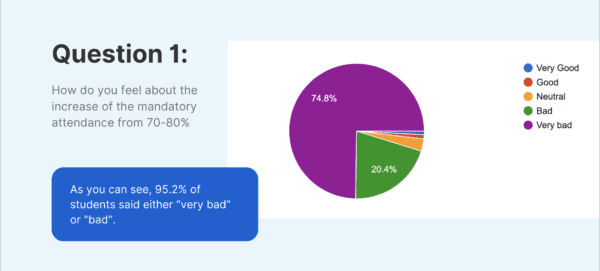This article analyses and contains strong opinions on IE University’s attendance policy, recently updated and first announced on Thursday, 27 July 2023.
The rumors of IE’s new attendance policy are true and have been circulating for some time now, so it shouldn’t come as much of a shock when the official announcement came through.
Students attending less than 80% of sessions will receive a FAIL for the course.
IE University
IE University students must now attend 10% more classes to avoid failing an individual course.
Of course, the new policy has already proven to be a severe bone of contention, with all the debates and disagreements that the topic is already steeped in.
A common misconception exists that the number of classes a student attends directly correlates with the quality of their education. Yet, equating quantity with excellence oversimplifies the intricate learning process, and it is vital to recognize that more than merely compelling students to attend classes is needed to guarantee an attentive and engaged mindset.
Proper comprehension and assimilation of knowledge stem from a genuine desire to learn rather than mere compliance with attendance rules. Going to class without paying attention and absorbing the material could be as useless as sitting at home doing nothing.
Acknowledging that every student possesses unique learning capabilities and preferred methodologies is imperative. Raising attendance requirements restricts their autonomy to decide what works best for their learning journey. Allowing students the freedom to implement their most suitable and efficient learning methods empowers them to become self-directed learners.
This self-directed approach fosters an environment where students feel motivated by their intrinsic curiosity, leading to a deeper and more meaningful grasp of the subject matter. And frankly, if the only reason students can pass or do well on their exams is that they are being forced to be in class, then these same individuals will be utterly helpless after they graduate since they are not taught how to make any of the “less-than-convenient” decisions that’ll get them to where they need to be by themselves.

One of the primary goals of IE University is to nurture responsible and independent individuals. By holding students accountable for their academic success and allowing them to make decisions about attending classes, IE would instill valuable life skills such as time management, discipline, and maturity. This responsibility cultivates a sense of ownership in their education, ultimately leading to more profound personal growth and self-awareness.
Universities serve as breeding grounds for future leaders and innovators. However, enforcing stringent attendance policies can inadvertently promote a culture of conformity and passive compliance. The spirit of innovation thrives when students are encouraged to question and challenge existing norms, fostering a creative and dynamic intellectual environment. Empowering students to take control of their learning experiences fosters a mindset of initiative and forward-thinking. This matter is especially true for IE University when considering its pillars – especially innovation.
IE’s new attendance policy states that “attendance is an essential component of IE´s learning methodology,” which, when considering the above takes regarding mandatory attendance, seems not to align with the rest of IE’s pillars and overall approach to learning methodology, which, until now, seemed to align with independence and cultivating their students as leaders as opposed to followers.
Furthermore, as lenient as administrators think, 30% – or rather 20% as of now – is, to begin with, the student body strongly disagrees. Furthermore, the Student Government was not consulted on the matter beforehand – as they have made clear – and according to their reactions and the entire student body, no one is really on board with the new policy.
To further corroborate this and gauge precisely how much of the student body is opposed, Student Government surveyed almost 1’400 students, who not only answered multiple choice questions about how they feel about the new policies and voted on their proposed attendance requirements but were also allowed to discuss, in detail, their experiences with the rigidness of excusing absences.
IE has further stated in its updated policy that “Health problems, visa delays, travel restrictions, personal trips, appointments, family celebrations, or other personal matters are to be treated as exceptions (which) cannot total more than 20% of the student’s overall attendance in the course.” The new policy also stipulates that the program management study individual cases in exceptional circumstances. However, it has been made clear through all the students’ past experiences – ones mentioned in the survey responses – that this process has not always yielded the most accurate results.

Some of these responses are highlighted in the student body government’s presentation, which summarises their poll results, which you can access, and I highly encourage you to here.
While the intent behind raising attendance requirements may be well-meaning, a closer examination reveals potential drawbacks that outweigh the perceived benefits. Quality education should prioritize individualized learning, fostering a genuine passion for knowledge and nurturing independent thought.
By embracing students’ diverse learning styles and promoting responsible decision-making, IE can better prepare their students to become leaders and visionaries who drive positive change in the world.
Let us celebrate the pursuit of wisdom and embrace that proper growth and enlightenment come from within, not from mere classroom seat-time.






